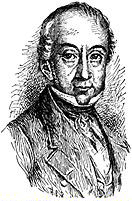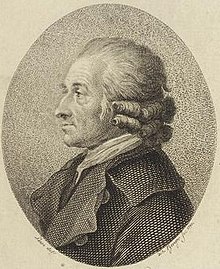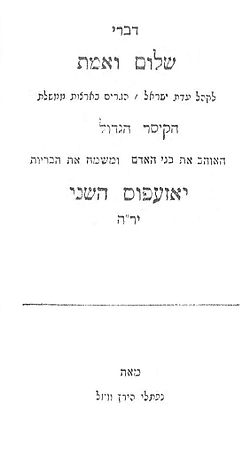
The Haskalah, often termed the Jewish Enlightenment, was an intellectual movement among the Jews of Central and Eastern Europe, with a certain influence on those in Western Europe and the Muslim world. It arose as a defined ideological worldview during the 1770s, and its last stage ended around 1881, with the rise of Jewish nationalism.

Mesillat Yesharim or Mesillas Yeshorim is an ethical (musar) text composed by the influential Rabbi Moshe Chaim Luzzatto (1707–1746). It is different from Luzzato's other writings, which are more philosophical.

Hebrew literature consists of ancient, medieval, and modern writings in the Hebrew language. It is one of the primary forms of Jewish literature, though there have been cases of literature written in Hebrew by non-Jews. Hebrew literature was produced in many different parts of the world throughout the medieval and modern eras, while contemporary Hebrew literature is largely Israeli literature. In 1966, Agnon won the Nobel Prize for Literature for novels and short stories that employ a unique blend of biblical, Talmudic and modern Hebrew, making him the first Hebrew writer to receive this award.

Jewish literature includes works written by Jews on Jewish themes, literary works written in Jewish languages on various themes, and literary works in any language written by Jewish writers. Ancient Jewish literature includes Biblical literature and rabbinic literature. Medieval Jewish literature includes not only rabbinic literature but also ethical literature, philosophical literature, mystical literature, various other forms of prose including history and fiction, and various forms of poetry of both religious and secular varieties. The production of Jewish literature has flowered with the modern emergence of secular Jewish culture. Modern Jewish literature has included Yiddish literature, Judeo-Tat literature, Ladino literature, Hebrew literature, and Jewish American literature.
David ben Naphtali Fränkel or David Hirschel Fränkel, was a German rabbi.

Isaac Samuel Reggio (YaShaR) was an Austro-Italian scholar and rabbi. He was born and died in Gorizia.

The Me'assefim were a group of Hebrew writers who between 1784 and 1811 published their works in the periodical Ha-Me'assef, which they had founded.

Isaac Abraham Euchel was a Hebrew author and founder of the "Haskalah-movement".
The Biurists were a class of Jewish Biblical exegetes, of the school of Moses Mendelssohn. Most of the Biblical commentators immediately preceding Mendelssohn had interpreted the Biblical passages from an individual point of view, and Mendelssohn was concerned to obtain clarity as to the actual meaning of the passages.
Joel Löwe, best known by the pen name Joel Bril, was a German Biblical commentator.
Musar literature is didactic Jewish ethical literature which describes virtues and vices and the path towards character improvement. This literature gives the name to the Musar movement, in 19th century Lithuania, but this article considers such literature more broadly.
David Franco Mendes, also known as David Ḥofshi, was a Dutch-Jewish Hebrew-language poet. He was an early member of the Haskalah in Holland.
Naphtali is the sixth son of Jacob in the Bible and the founder of the Israelite Tribe of Naphtali.
Biblical grammarians were linguists whose understanding of the Bible at least partially related to the science of Hebrew language. Tannaitic and Ammoraic exegesis rarely toiled in grammatical problems; grammar was a borrowed science from the Arab world in the medieval period. Despite its foreign influence, however, Hebrew grammar was a strongly Jewish product and developed independently. Scholars have continued to study grammar throughout the ages, until the present. Those mentioned in this article are a few of the most eminent grammarians.

Salomon Jacob Cohen was a German Jewish Hebrew scholar, teacher, writer and translator of the Bible. He was an important representative of the Haskalah in Berlin, Hamburg and Vienna.

Yechezkel Feivel ben Ze'ev Wolf was the Maggid in Vilnius in the early 19th century and the author of several books, including Toldos Adam, a hagiography of Rabbi Zalman of Vilna, the famed brother of Chaim of Volozhin and student of the Vilna Gaon.
Karl Bernhard Wessely, also Carl Bernhard Wessely, was a German composer. He was born to a Jewish family in Berlin associated with intellectual circles, both Jewish and Christian: his father was Naphtali Hirz Wessely. Wessely was conductor and Hofkapellmeister of Prince Henry of Prussia in Rheinsberg. He composed, among other pieces, a cantata mourning of the death of Moses Mendelssohn,.
Naphtali ben David of Amsterdam was a Hebrew author.
Naphtali Hirsch ben Jacob Goslar was a German rabbi and philosopher.









